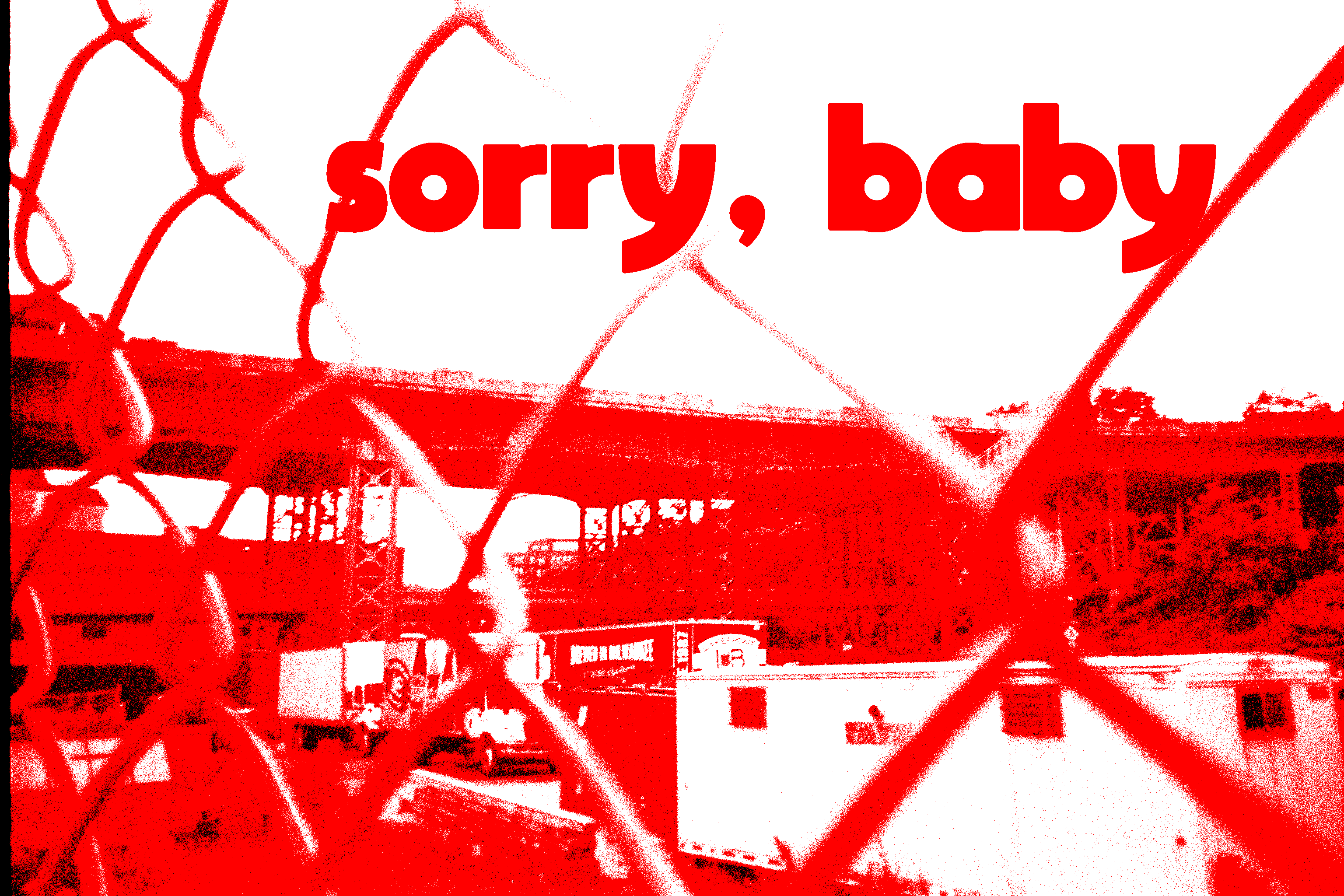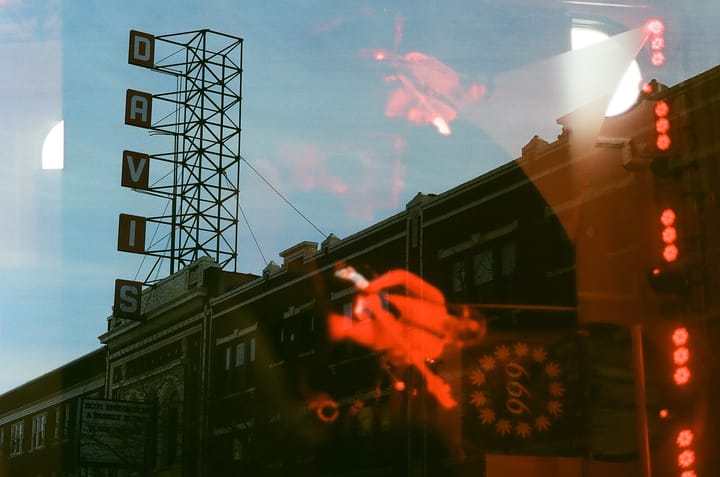sorry, baby
the best movie i saw this year. i sobbed the whole time.

A while ago now I bought a ticket to see Eva Victor's debut film, Sorry, Baby, at the Davis Theater. It was playing on a Thursday night after I got off work. I had a glass of wine at the bar connected to the theater, Sojourn. I think it was a Malbec, but it could have been a pinot noir. Every red wine I've ever had is a Malbec in my memory.
I like the Davis because most of the time if you go to Sojourn before or after the showing you'll be sitting with a handful of people who are about to see or just saw the same movie as you. It feels a little bit silly to sit in the bar in the Music Box, it doesn't feel silly to go to Sojourn. I talked with some guys about Conclave there while it was raining too hard to want to leave directly after after we all saw it. It feels a little bit more communal and the drinks are good.
I knew the broad strokes of the plot of Sorry, Baby before I bought tickets. Something terrible happened to Agnes, says the description of the film on A24's website. That means sexual assault. There was no other option than for it to mean sexual assault. For me, that usually just means I buy a can of wine with my popcorn instead of a water.
I steer clear of movies that depict sexual violence as a singular act– horror movies that use it as gore, men forcing themselves on women to establish themselves as sketchy dudes, that sort of thing.
So often when movies (usually made by men) depict sexual violence they do so as that singular act of violence. It’s because men, I think, mainly perceive sexual violence as a singular act from the perspective of the perpetrator. It’s rape from the point of view of the rapist, even though, usually, you the viewer are supposed to sympathize with the victim. It’s rape to prove something about the rapist, not rape as something that has happened to an individual.
I have been diagnosed with PTSD, I don’t need to be shown something graphic for shock value, but Sorry, Baby isn't focused on the visceral violence of that singular act. The perpetrator is almost irrelevant except for his place as an advisor to Agnes. The audience doesn’t see the sexual assault at the center of everything. There’s no visible struggle. No screaming. Just walking into a house and then putting on their boots outside on the stairs upon leaving that house. It’s clear in the emotion generally what happened.
To me, it’s almost more horrible that we find out what happened to Agnes through them telling their best friend. To me, sexual violence predominantly lives in the intimate conversations victims have with the people around them. The sexual violence I've experienced has mostly lived in the way I discuss it with my friends or in telling my mom I didn't want to press charges or how I write about it here.
Earlier this summer I spent a lot of time tuned into a sexual assault trial in Canada. It was the crown against a group of hockey players who played on the World Juniors team in 2018. The victim gave testimony for something like nine days. It was harrowing and nearly impossible for me to even read about— group sexual assault as recounted by a girl who was clearly terrified and under-supported. The accused were found not guilty. I knew they would be. The whole trial was bizarre and grotesque. The reaction to it only made everything worse. Female and queer hockey fans were being attacked by men for not trusting the court’s verdict— men who sympathize more with those accused and have the privilege of deciding to care more about the Oilers getting a decent goalie than about the young woman who was degraded on the stand. The team I like best might sign two of them. I'm not sure how to understand that decision.
And again, it's all because men view sexual violence – and especially if done by white men, all violence – as a singular act. A singular choice. A singular mistake that need not be punished. Hey, they were young. Why should we let these things stand in the way of some team getting a decent goalie? We’ve all made mistakes, right?
In Sorry, Baby, it’s clear from the beginning that sexual violence ends up being more like a network of roots than just a singular moment of pain. I sobbed for most of the run time, starting with Agnes saying they understood why their professor enjoyed the light in his office when their best friend proposed asking for a different office.
Earlier this year I wrote about stealing a jacket from my ex-boyfriend and feeling like a bad victim.


In some ways, I feel like I shouldn't have to want to get away from it. As a victim of sexual violence, you shouldn't have to avoid anything related to the person who hurt you. I tend to believe it only hurts me more to pretend those years of my life never existed. My friend who told me they loved Sorry, Baby told me later that it occurred to them they should have warned me, but I shouldn't have to avoid anything that broaches the topic of sexual violence. I shouldn't have to not wear the jacket. I should be able to remember my own past. Agnes should be able to enjoy the light in the office. It's nice even if it makes you remember someone you don't want to. It's okay to still like it.
Online there is so much of an attitude toward sexual violence that amounts to "To be raped is worse than to be murdered because you never get over it" and I really chafe against that framing. I left Sorry, Baby emotionally destroyed. It reminded me that my childhood best friend is a mother with a beautiful home and husband. It reminded me that being raped stole any hope of finishing law school from me. For a few hours it felt like my life had been ruined all over again. I was angry again. It's been years and I don't really feel any less angry, but would I rather be dead? No. Definitely not.
What I did was book train tickets to Pittsburgh to see my friends that I only have because all of that bullshit happened and it led me to writing while I was spiraling in law school years ago.
Sorry, Baby is ultimately a story more about that – about going to visit your friends and finding love that may or may not actually make you feel better and the lack of choice when it comes to continuing on – than any other story you see about sexual violence. It's not a fantasy of revenge. It's not a side character plot device to say something about a male character. It's something grounded in reality and the reality of sexual violence is sad because it's banal.
It's texting your friends to downplay what happened to you – even though it might get you discredited in a court case years later by lawyers representing would-be professional hockey players. It's sitting in your bath tub telling your friend what your shared professor did. It's living with a friend for a few weeks because your now ex-boyfriend won't move out and you can't stand being near him. It's telling someone you're embarrassed it sometimes still feels like what he did to you is ruining your life.
But I think it's a mistake to talk about sexual violence like a death sentence. I think it's dangerous to fall into to that mindset, even though I understand it is a desperate plea for men to take sexual violence seriously. I just think we should not prioritize that uncritically.
Sorry, Baby was devastating because it's a story of continuing on, whatever that means. It was devastating because I saw myself – stunted and weird and fundamentally different because of violence – and my friends so profoundly inside the story being told. At the same time, it is still ultimately more human to be continuing on than anything else.
This past weekend I saw Phantom Thread at a special showing at the Music Box. I sat at the very back in the very center. I love Phantom Thread. I love the Music Box. It's not optimal viewing really, but I love that when you sit at the back you can see all 700 or so other people in the room. I've seen the movie enough that this was more about that anyway.
While I watched it this time I thought a lot about how in 2017 I saw the same movei in the same theatre with about 680 fewer people, but with the person who would eventually cause me to write all these weird little essays about coping with sexual violence. It's one of my funnier memories at the movies. A man in front of us at the theatre turned around after and said, "that was crazy" then left. We laughed about it a lot throughout the day.
This time I sat alone and listened to people laugh a little too loud at dialogue that I think warrants a chortle at best. I thought about my friend Eric who loves this movie and loved Sorry, Baby, too. I thought about the last time I saw this movie here and it didn't hurt.
The movie doesn't have to be lost to the violence. I see why he wanted to see it. I see why he liked the Music Box. I see why he liked the light. And that's fine.
Sorry, Baby is my favorite movie I've seen this year. Watch it when it comes out on HBO in a month or whatever.
Miranda Reinert is a music adjacent writer, zine maker, podcaster and law school drop out based in Chicago. Check out PDFs of most of my zines at the link on the top of the screen. Follow me on Twitter or Bluesky to keep up on what movies I go see at the Music Box: @mirandareinert. This blog does have a paid option and I would so appreciate any money you would be willing to throw me! You may also send me small bits of money at @miranda-reinert on venmo/on Paypal if you want. As always, thanks for reading!




Comments ()